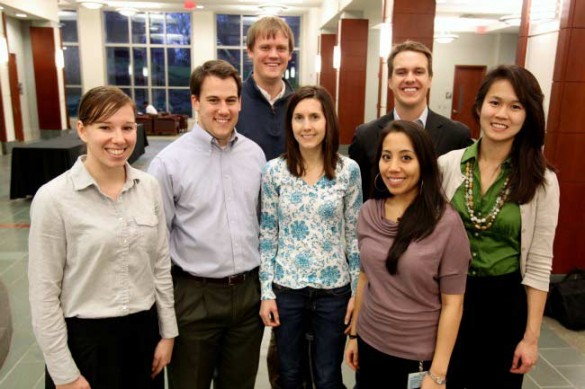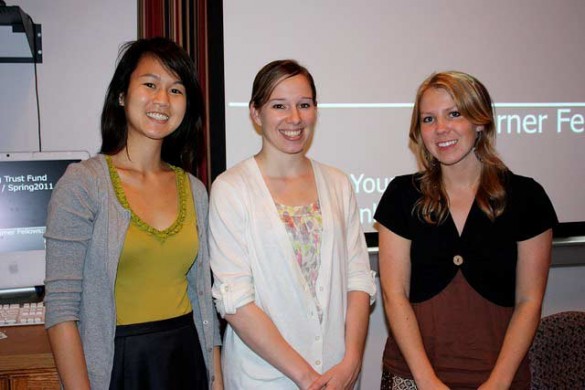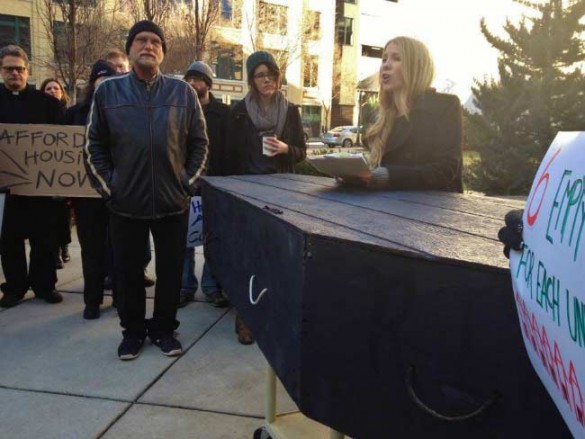
A group of Cal Turner Fellows who brought renewed attention through a two-year research project to Nashville’s dire need for more affordable housing helped lay the foundation for Mayor Karl Dean’s recent announcement on a housing trust fund.
During the mayor’s 2013 State of Metro address, Dean revealed the establishment of an affordable housing trust fund for Nashville with $3 million in seed funding.

“The affordable housing fund is a product of the concerted efforts launched and led by the Cal Turner Program Fellows at Vanderbilt University,” said Claire Smrekar, associate professor of public policy and education and adviser to the fellows studying this issue.
Vanderbilt Divinity School graduate Lindsey Krinks, who was among the Cal Turner Program Fellows who worked on the project, has continued to be a strong advocate for the homeless. Krinks, who earned a master of theology last month, noted that the Rev. Bill Barnes, for whom the affordable housing trust fund is named, was an early leader in efforts to address the problem. “Barnes was absolutely correct,” Krinks said. “We need local solutions for local problems and the lack of affordable housing has continued to get worse for the working poor.”
She noted that this has been at least a ten-year process for housing advocates and community leaders to create a local housing trust fund. “I am thankful that our project was a catalyst for moving forward,” Krinks said. “We worked to ‘dust off’ an earlier proposal and re-energize efforts.”
Each year the Cal Turner Program for Moral Leadership in the Professions offers fellowships to Vanderbilt professional students to address significant social problems by utilizing leadership skills and professional expertise. The students are selected from a variety of disciplines.
“From nursing, medicine, education and human development, engineering, divinity, law and business, the students represent the very best and are among the most committed to public service and ethical leadership,” Smrekar said. “They promoted a coalition of informed, concerned citizens to bring attention to this issue, and to galvanize a response to this tale of two cities: one that some residents can afford to live in, and another that is beyond the reach and reality of average working families.”
During the 2010-2011 academic year, Krinks was among those who examined best practices for housing trust funds in Charlotte, N.C., and Indianapolis. Other fellows in the group that first year were Geraldine Young, Law School; Katie Knies, Peabody College; and Israel Ovalle, Owen Graduate School of Management.
The next academic year, a second group of fellows continued to examine the political and financial climate for the fund in an effort to determine the strongest course of action. They included Emily Rowell Brown, Divinity School; Dan Angius, Owen Graduate School of Management; Meghan Rowland Boyls, School of Nursing; Karishma Merchant, Peabody College; William Sullivan, School of Medicine; Rachel Ruiz, School of Medicine; and Todd Lagus, School of Engineering.

Among the fellows’ activities was a community panel discussion, moderated by Smrekar, in January 2012 at Vanderbilt Law School. The panelists included Mary Brooks, project director of the Center for Community Change’s Housing Trust Project.
There are approximately 700 housing trust funds across the nation, including one for the state of Tennessee. The next step for the establishment of the local affordable housing trust fund will be for Metro Council to approve creation of an oversight board.
“We must show that we can move forward and get at least a few projects funded during the coming year,” Krinks said. “That will be important as we look for a dedicated source of funding for the future.”
Krinks first became interested in the affordable housing issue as a Lipscomb University undergraduate. She was walking downtown with some friends in 2007. “I saw a storefront window with the following statistics: a minimum wage worker has to work 89 hours a week, 52 weeks a year, to afford fair market rent housing,” Krinks said. “[rquote]We are not talking about people who don’t work. These are people who work hard and still can’t afford fair market rent.”[/rquote]
Krinks said that she has done homeless outreach and seen the faces and heard the stories of those on the street who die waiting for housing. “This goes beyond just getting a roof over people’s heads,” Krinks said. “This is about dignity, about human flourishing and about justice.”